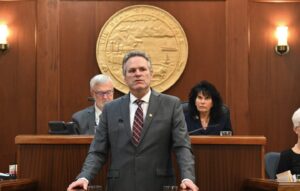Op-Ed: Sex-ed publisher reaching millions is grooming children as early as kindergarten
An organization offering free K-12 sex education is soaked with LGBT propaganda, including instruction about self-pleasure and letting people touch your body.
Since 1980, Advocates for Youth (AFY)…

An organization offering free K-12 sex education is soaked with LGBT propaganda, including instruction about self-pleasure and letting people touch your body.
Since 1980, Advocates for Youth (AFY) has been at the forefront in implementing Comprehensive Sex Education (CSE) programs in American schools.
Unlike the “Family Life” classes of the mid-20th century, where the biological specifics of human reproduction were taught, today’s CSE encompasses every aspect of human sexuality, including specific instruction on aberrative/deviant behaviors, which are reliably presented in an “affirming” fashion.
The trio of transgenderism, gender identity and homosexuality suffuse AFY’s curriculum titled Rights, Respect, Responsibility. Launched in 2016, the 3R’s is billed as “the first K-12th grade sex education curriculum fully mapped to the National Sex Education Standards, LGBTQ inclusive and covers all 16 topics recommended by the Centers for Disease Control and Prevention (CDC) as essential components of sexual health education.”
However, a review of the 3R’s subject matter reveals a mere fraction of the material deals with the dominant expression of human sexuality – heterosexuality – in favor of an outsized obsession with anything else.
AFY programs normalize homosexual and transsexual behaviors as “healthy expression” of sexuality, despite evidence showing far higher incidences of mental illness and self-harm among sexually aberrant youth and adults.
AFY charges nothing for its curriculum and lesson plans, which they boast “are being used in more than 100 school districts, including 11 of the largest 25 school districts reaching more than 2.3 million students.”
While offered to schools as sex education, the group is far from circumspect in their overall aim. Under the banner, “Our Bodies. Our Lives. Our Movement,” AFY writes “Young people understand that reproductive and sexual health and rights are inextricably tied to social justice and the fight for liberation. Join thousands of youth activists and adult allies as we build a better and more equitable world.”
One resource recommended by AFY, Amaze.org is meant to “harness the power of digital media to provide young adolescents around the globe with medically accurate, age-appropriate, affirming, and honest sex education they can access directly online—regardless of where they live or what school they attend.”
The website includes an exposition on why kindergarten isn’t too soon to talk about sex, and another that advocates for using porn as an aid in sex education.
While AFY’s training section of the website keeps lesson overviews generally vague, occasional admissions that their content is tightly targeted toward the most controversial aspects of sex education in America can be found:
“While not required, we do highly recommend that educators receive training specifically on the new 2021 supplemental lessons as these new topics can be particularly challenging for even the most seasoned educator (topics may include but are not limited to – racial justice and the impact of racism on sexual health; teaching about anatomy that is intersex-inclusive; teaching about puberty that is inclusive of transgender experiences; and reproductive justice).”
It’s important to note each of the above supplemental lessons are intended for children as early as 1st grade.
AFY is particularly proud of one element of their training regimen, “Virtual Professional Development,” a “simulated environment (classrooms, nurse’s office) where professionals can practice with youth avatars in various scenarios” to quickly master the skills necessary to “be effective.”
One module addresses what to do when a student is touching their genitals in class. The teacher is told to explain that “genital touching is normal, but may make others feel uncomfortable,” acknowledging “it may feel good, but it’s important we only do it when we’re alone.”
This particular training is intended for children from preschool to fifth grade.
The programming of the child avatars in AFY’s virtual professional development modules reveals a provocative mindset. In one segment portraying high school students, a female student begins flirting with the teacher, a behavior that is ignored during the lesson, and never addressed during or after the module’s completion.
Elementary age children ask very specific and advanced sexual questions, all of which are treated as entirely appropriate to their age group.
Another module geared to early elementary grade students teaches students that “their body belongs to them and they have the right to decide who touches them and how.” While the training does acknowledge boundaries exist, it’s also quick to mention that “different people have different boundaries,” and refocuses the entire lesson to the idea of consent.
The idea of “safe and unsafe touching” is jettisoned and replaced by a transactional mindset where the appropriateness of the act is less important than whether consent was first obtained, with consent being the ultimate good. This framing of interpersonal interactions between children and the older kids and adults around them serves to legitimize the introduction of aberrant behaviors as ok, if accompanied with consent.
This unmooring of bodily autonomy from traditional or even biological strictures lies at the core of Comprehensive Sex Education, facilitating the expansion of sexual horizons at ever earlier ages.
This redefining of boundaries as transactional delegitimizes social and religious taboos, and undermines the authority of parents, families and faith leaders in the forming of a child’s worldview. At its essence, CSE holds that all sexual predilections are values-neutral and ought not be judged.
Once that is established, each and every sexual expression becomes fine, as long as it’s accompanied with the magical application of “consent.”
This libertine outlook may be workable among adults who have the capacity and agency to choose, but when it becomes the governing framework for instructing developing youth, it quite aptly meets the definition of “grooming.”



